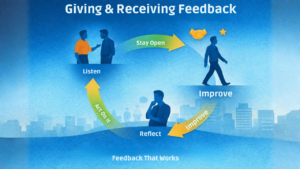Leadership Starts with How You Use Time
In today’s fast-paced business environment, time coaching for leaders is more than a nice-to-have—it’s essential. Poor time management isn’t just a personal inefficiency; it directly affects team performance, staff wellbeing, and organisational outcomes.
When leaders struggle to plan, prioritise, or delegate effectively, the result is predictable: increased stress, decreased output, missed deadlines, and low morale. Over time, this creates a ripple effect—burnout, reduced trust in teams, and disengagement become the norm.
But with productivity coaching in Australia, there’s a way forward. A structured approach to time and energy management helps leaders overcome common pitfalls and unlock more effective, empowered teams.
1. Replace Control with Collaboration
Many leaders fall into the trap of micromanaging. This “control” approach often stems from good intentions—but it limits team growth and drains the leader’s own bandwidth.
Time coaching encourages a shift from control vs collaboration to a more balanced leadership style. Leaders learn how to structure their days around what only they can do, while creating space for their team to take ownership. The result? Better outcomes, more accountability, and greater team resilience.
2. Solve Leadership Delegation Issues
Poor delegation is one of the most common challenges we see in leadership teams. Whether it’s a lack of trust, a fear of overloading staff, or simply the belief that “it’s quicker if I do it myself,” the result is the same: bottlenecks and burnout.
With time coaching, leaders learn to match tasks to capability and potential—empowering their team while freeing themselves to focus on strategic work. Addressing leadership delegation issues leads to stronger internal capability and more meaningful development opportunities for team members.
3. Build Trust in Teams
Trust doesn’t come from weekly catchups or status updates alone. It’s built through empowerment, shared purpose, and consistent behaviour from leaders.
Time coaching teaches leaders how to structure conversations, distribute responsibility, and model healthy habits. When staff see their leaders managing time effectively, it signals a culture of clarity and support—making trust easier to establish and maintain.
4. Strengthen Coaching Leadership Habits
A coaching approach to leadership involves guiding rather than instructing. It’s about asking better questions, giving timely feedback, and creating a culture where people solve problems independently.
Through coaching leadership habits, time management becomes less about squeezing tasks into calendars—and more about creating space for focus, connection, and reflection. These habits drive long-term culture change and performance.
5. Drive Team Empowerment and Productivity
Empowered teams are productive teams. When leaders model effective time use and set clear priorities, teams become more autonomous, make faster decisions, and collaborate more fluidly.
Time coaching focuses on embedding systems and routines that support team empowerment, enabling each person to contribute their best. With fewer roadblocks, team members are more likely to meet deadlines, innovate, and maintain energy.
6. Safeguard Mental Health and Work-Life Balance
Unchecked time pressure doesn’t just lower performance—it damages wellbeing. When workloads grow without boundaries, leaders and teams alike face high stress, poor decision-making, and emotional fatigue.
Time coaching supports leaders in fostering a more sustainable pace. From shared schedules to prioritisation rituals, leaders can ensure that time is protected for both deep work and meaningful breaks—improving both productivity and mental health.
Time Coaching That Transforms Workplaces
Being a leader means making constant decisions that affect the wellbeing, engagement, and output of your team. With the right support, leaders can shift away from reactive busyness and step into strategic influence.
At Team Focus Plus, we offer productivity coaching in Australia tailored to leadership needs. Our programs focus on sustainable, high-performance routines that enable better decision-making, stronger delegation, and greater trust across teams.
📞 Let’s talk. Call us on 1300 551 274
📧 Or email team@teamfocusplus.com
Let’s build a culture where time works for you—not against you.
Read more about
Navigating Leadership vs Management: Why Both Matter for Australian Business Leaders





